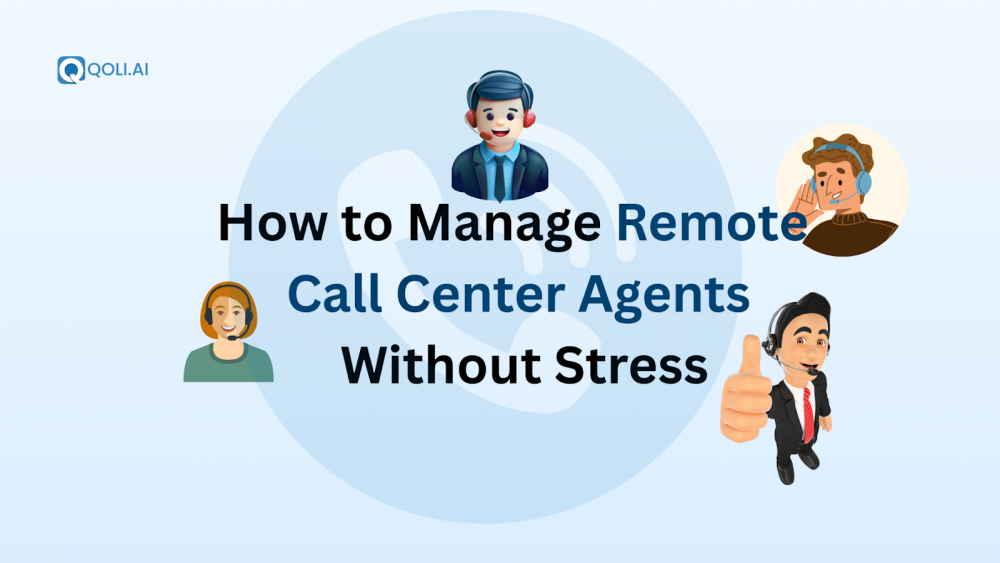
Managing a call center is already a big job. When your team works from different places, it can feel even more difficult. As a manager, you may often ask yourself:
- Are my agents staying productive?
- Are customers getting the right support?
- How do I make sure everyone is working as a team?
- How can I manage all this without stress?
The good news is—you can. With simple steps and the right approach to remote agent monitoring, managing a remote call center becomes smooth and stress-free. This guide will show you how.
Why Remote Agent Monitoring Matters
When your agents are not sitting in the same office, it’s harder to see what’s really happening. This is where remote agent monitoring becomes important. It helps you:
- Track performance – You can see how agents are handling calls and if customers are satisfied.
- Build trust – Monitoring gives you clear data, so there’s no guesswork. Agents know what is expected, and you know how they are doing.
- Find problems early – If an agent struggles, you can support them before it affects customers.
- Improve customer experience – With better tracking, you can make sure every customer gets quick and helpful service.
Remote monitoring is not about spying. It’s about creating a fair and balanced system where everyone can do their best without stress.
Set Clear Expectations from the Start
Remote call center best works when all the people are aligned. In the absence of goals, the agents can get lost and managers can get stressed. That is why it is very important to establish simple and transparent rules at the outset to manage a stress-free remote call center.
Here’s what helps:
- Clarifying team objectives – Express what you want to achieve, be it customer satisfaction, fast response times or improved call handling.
- Share performance tracking practices – Inform agents about how their performance is going to be assessed, e.g. based on call quality, call response speed, or customer feedback.
- Keep communication open – Ensure that agents can ask questions and keep up and in touch with the team.
- Focus on productivity and not numbers – Force agents to deliver good customer service and not the number of calls they are required to make.
With clear expectations, agents will experience a sense of confidence and managers will not worry so much about tiny details. This equilibrium helps the entire system to run in an orderly manner.
Use the Right Tools for Monitoring & Support
- It is so much easier to manage remote agents having the correct tools. It is not to see each step, but to help your team and ensure that nothing goes wrong.
- Here’s what works well:
- Call tracking and recording- They are used to know how your agents are handling customer calls. You will be able to identify the places to make improvements and reward positive performance.
- Performance dashboards – It is time and stress saving to view metrics such as call times, customer satisfaction or resolution rate.
- Team collaboration software – Messaging applications, shared documents, or board boards hold the entire team together and on track
- Qoli.ai to monitor remote agents – A simple bot such as Qoli.ai enables you to track calls, monitor performance and ensure that your agents are not micromanaged.
You do not have to spy on your team to use these tools. Rather, it provides you with clear insights and assists you in supporting agents when necessary and makes remote management much more convenient.
Focus on Productivity, Not Micromanagement
Attempting to control every minute detail is one of the poorest mistakes in the management of the remote call center. Micromanaging is stressful on both managers and agents. Rather, look at productivity and results
Here’s how to do it:
- Set clear goals – When agents know what is expected, they can work independently without constant check-ins.
- Trust your team – Give them space to handle tasks in their own way. Trust encourages responsibility and motivation.
- Track results, not activity – Use metrics like call quality, customer satisfaction, and issue resolution instead of monitoring every minute of work.
- Provide feedback regularly – Support your agents with constructive guidance and recognition, rather than constant corrections.
Your remote team will be productive, happy, and engaged by concentrating on the results rather than micromanaging each step. The level of stress among managers reduces and the job performance of the agents is enhanced.
By keeping your teams Engaged and Motivated
The finest monitoring and tools will not serve you, unless your agents feel disconnected or unmotivated. Interaction is a major component to a successful and joyful remote call center staff.
These are just a few ways of ensuring that your team is motivated:
- Check-ins regularly- Minute, cordial meetings assist agents to feel connected and assisted.
- Reward performance – Showcase the best performers, milestones or gains. Small rewards go a long way.
- Promote learning -Give training or tips to enhance skills. As agents increase, so does the team.
- Create teamwork – Keep the team spirit alive through group chats or virtual hangouts, to ensure that the team does not seem like a group of individual workers.
- Hear feedback – Inquire of agents about their problems and suggestions.. Acting on their input shows you value them.
Engaged agents perform more efficiently and become more ownership-seeking towards their tasks and deliver quality services to customers. A smooth, stress free call center is accompanied by motivation and overseeing the remote agent in a smooth manner.
Conclusion
You do not need to be stressed when managing the remote call center agents.Putting the right tools into place, a clear team expectation, and an emphasis on productivity, rather than micromanagement will allow you to have a productive and smooth team.
Remember:
- Set goals clearly
- Use tools like call tracking, call recording, and Qoli.ai for easy remote agent monitoring.
- Focus on results, not constant supervision.
- Keep your team engaged, recognized, and supported.
With these steps put together, your remote agents will remain productive, motivated and satisfied. And as a manager, you can have a stress-free system which works to the whole.
Remotely managing is not about monitoring each and every step, remotely managing is all about providing a proper environment so that your team can perform, and that your customers receive the best service.







